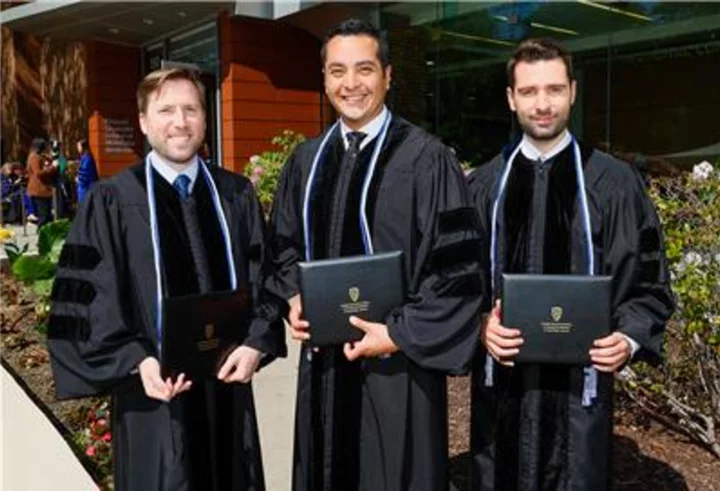The US Supreme Court’s two Black justices sparred over the meaning and impact of race in dueling opinions on the majority’s decision to curtail affirmative action programs at universities.
Justice Clarence Thomas accused Justice Ketanji Brown Jackson of having a “race-infused world view” that “falls flat at each step,” in an opinion concurring with the court’s decision on Thursday, which gutted the use of race in college admission decisions at the University of North Carolina and Harvard College.
Thomas said individuals are the sum of their unique experiences, challenges, and accomplishments.
“What matters is not the barriers they face, but how they choose to confront them,” he said. “And their race is not to blame for everything—good or bad—that happens in their lives.”
Jackson responded to Thomas in a footnote of her opinion dissenting from the conservative majority’s 6-3 decision. She wrote that “Justice Thomas’s opinion also demonstrates an obsession with race consciousness that far outstrips my or UNC’s holistic understanding that race can be a factor that affects applicants’ unique life experiences.”
Read More: Supreme Court Rejects Use of Race in University Admissions
She said Thomas doesn’t dispute, nor could he, the origins and continued existence of race-based disparity “yet is somehow persuaded that these realities have no bearing on a fair assessment of ‘individual achievement.’”
Intra-Racial Divisions
It was a striking exchange on affirmative action during a historic term. Never before in the court’s history have two Black justices served together.
For a long time, Thomas enjoyed a singular authority when it came to matters of race, said Melissa Murray, a New York University School of Law professor.
With Jackson on the court as its first Black female justice that’s no longer the case, Murray said. “She’s also an authoritative voice on race and she’s contradicting him.”
Not only is there an intra-racial division between the two opinions, Murray said there’s also gender and generational dynamics at play.
She called the concurrence from Thomas, 75, a meticulous attempt to take down Jackson, 52, one that reads like “he’s an elder statesman and she is an errant daughter who doesn’t know as much as he does.”
The opinions highlight the breadth of diversity within the Black community.
Opponents of affirmative action say race can’t be given fixed weight because that suggests all Black people think alike, while proponents say the goal is to make sure schools admit a critical mass of racial minorities so they don’t feel pressured to be spokespeople for their race, said Kermit Roosevelt, a University of Pennsylvania Carey Law School professor.
Elise Boddie, a University of Michigan Law School professor, said a critical mass helps convey that there is diversity within the experiences of students of color.
“Because the court has shut down considerations of race in higher ed, students will lose the opportunity to see and experience that diversity within diversity,” she said.
Personal Experience
Both Thomas and the Supreme Court’s first Latina justice, Sonia Sotomayor, attended Yale Law School in the early days of the institution’s affirmative action program but have different views on how it affected them.
In speeches and opinions, as well as his 2007 memoir, Thomas shared the view that he found affirmative action stigmatizing. He said he felt like Yale had admitted him because of his race, not his achievements.
Sotomayor, who’s also been vocal about her experience, has championed the value of diversity. She said that colleges would overlook capable minority applicants with limited opportunities like her if it weren’t for race-conscious admissions.
Jackson, however, hasn’t expounded on her views on affirmative action until now. She largely avoided the topic at her Senate confirmation hearings despite having served on the Board of Overseers at Harvard where she earned her undergraduate and law degrees.
Jackson recused herself from the challenge to Harvard’s affirmative action program, but not the case challenging the practice at UNC.
In his opinion, Thomas argued the goal of the Fourteenth Amendment is to ensure equality for everyone regardless of their race and said he’s holding out enduring hope the country will live up to that principle.
Elizabeth Slattery, a senior legal fellow at the Pacific Legal Foundation, called his decision “uplifting.”
“He talks about the triumph of the Fourteenth Amendment and the second founding and ensuring that the Civil War meant something,” she said.
But Jackson said preventing race from being considered won’t make racism go away, that “ultimately, ignoring race just makes it matter more.”
While Jackson penned her own dissent, she also joined the main dissent Sotomayor wrote and read from inside the courtroom on Thursday. It was the first time a dissent has been read from the bench in four years.
Sotomayor blasted the majority opinion but tried to provide some guidance for universities going forward.
“To be clear, today’s decision leaves intact holistic college admissions and recruitment efforts that seek to enroll diverse classes without using racial classifications,” she said, adding that colleges and universities “can continue to consider socioeconomic diversity and to recruit and enroll students who are first-generation college applicants or who speak multiple languages.”
--With assistance from Patricia Hurtado and Tiana Headley.
(Updates with reactions to Thomas, Jackson opinions.)









